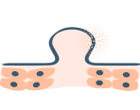Ehlers-Danlos Syndrome Precision Panel
Ehlers-Danlos Syndromes (EDS) are a clinically and genetically heterogeneous group of connective-tissue disorders, where the genetic defect affects collagen and connective-tissue synthesis and structure. It is characterized by hypermobility, cutaneous fragility and hyperextensibility.





